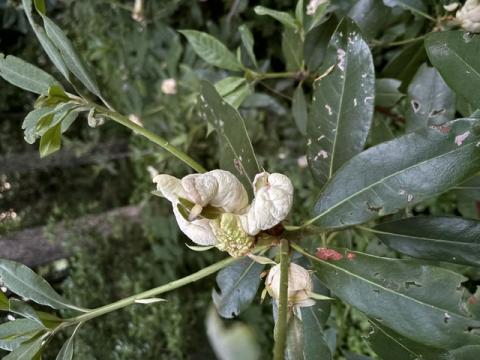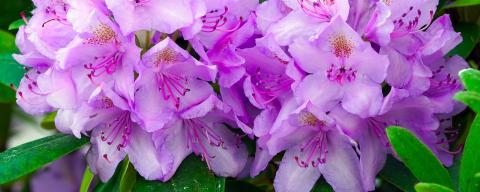What are the strange-looking, fleshy masses growing on the leaves and flowers of my rhododendron?
If you have noticed pale green, white or reddish-colored puffy masses forming on the leaves and flower buds of your rhododendron or azalea lately, you may be wondering what they are and whether they are damaging to the plant. These growths are galls, caused by fungal species belonging to the Exobasidium genus.
Exobasidium gall is a common and minor disease throughout New Hampshire and the Northeast, promoted by cool and wet weather during the spring and early summer. The initial infection occurs the spring before symptoms show, with spores spreading by splashing raindrops and wind.
The fungus overwinters on bud scales and penetrates developing leaves and flower buds as they emerge the following spring. Symptoms include swollen tissue that matures into small to large fleshy masses that transition in color from pale green, creamy white to reddish brown. As these galls mature, they will be covered in a white-colored layer of spores that will further disperse and perpetuate the infection.
Damage from this disease is usually minor and does not affect the overall health of the plant, although it can result in reduced flowering and decreased aesthetic value. Additionally, re-infection over multiple consecutive years can contribute to decrease plant vigor.
Plants growing in poorly-aerated soils and low air circulation are more prone to reinfection, and steps taken to alleviate these conditions are recommended (such as pruning older growth and increased sunlight.) Avoid overhead watering as well to prevent the risk of spore dispersal.
Management of this disease is mostly by handpicking and disposing of the galls, ideally before the white-colored covering of spores develops. Fungicides have not been shown to be very effective for this disease.
Certain rhododendron species have been reported as highly susceptible to Exobasidium gall, including Rhododendron maximum, R. catawbiense and their hybrids.

A mature Exobasidium gall on rhododendron that is producing a white layer of spores. Photo Credit: Jon Tapply
Do you love learning about stuff like this?
SUBSCRIBE TO Granite State Gardening newsletter
Got questions? The UNH Extension Yard and Garden Infoline offers practical help finding answers for your yard and garden questions.
Call toll free at 1-877-398-4769, Monday to Friday, 9 a.m. to 2 p.m., or fill out webform.
